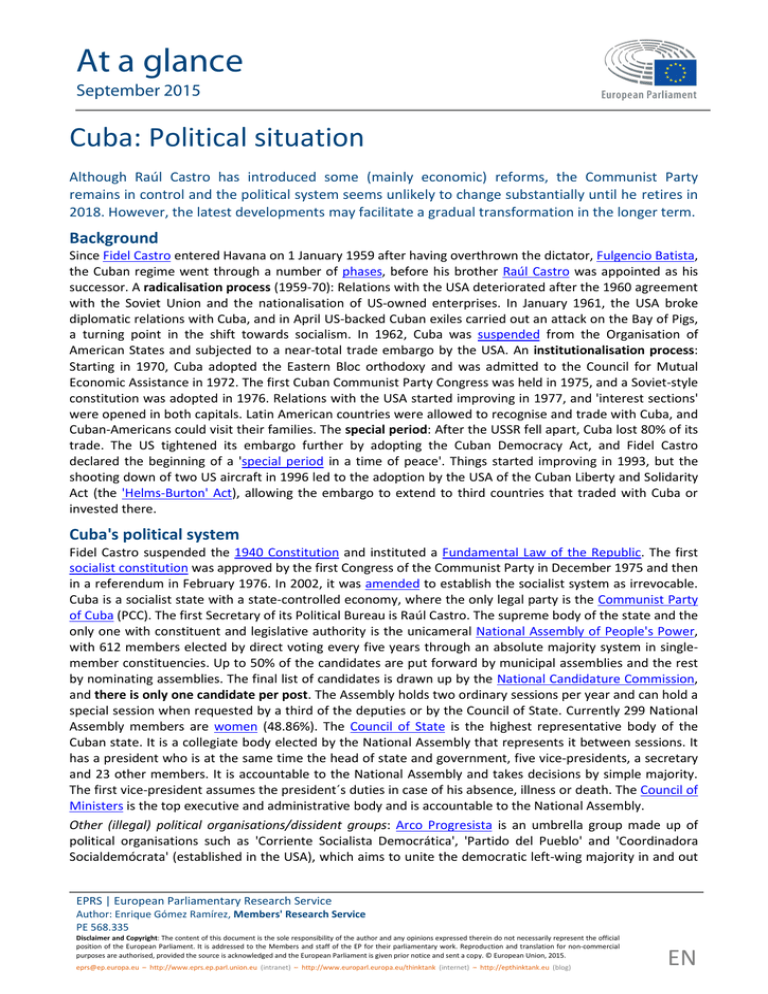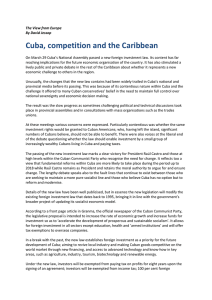Briefing European Parliamentary Research Service
Anuncio

At a glance September 2015 Cuba: Political situation Although Raúl Castro has introduced some (mainly economic) reforms, the Communist Party remains in control and the political system seems unlikely to change substantially until he retires in 2018. However, the latest developments may facilitate a gradual transformation in the longer term. Background Since Fidel Castro entered Havana on 1 January 1959 after having overthrown the dictator, Fulgencio Batista, the Cuban regime went through a number of phases, before his brother Raúl Castro was appointed as his successor. A radicalisation process (1959-70): Relations with the USA deteriorated after the 1960 agreement with the Soviet Union and the nationalisation of US-owned enterprises. In January 1961, the USA broke diplomatic relations with Cuba, and in April US-backed Cuban exiles carried out an attack on the Bay of Pigs, a turning point in the shift towards socialism. In 1962, Cuba was suspended from the Organisation of American States and subjected to a near-total trade embargo by the USA. An institutionalisation process: Starting in 1970, Cuba adopted the Eastern Bloc orthodoxy and was admitted to the Council for Mutual Economic Assistance in 1972. The first Cuban Communist Party Congress was held in 1975, and a Soviet-style constitution was adopted in 1976. Relations with the USA started improving in 1977, and 'interest sections' were opened in both capitals. Latin American countries were allowed to recognise and trade with Cuba, and Cuban-Americans could visit their families. The special period: After the USSR fell apart, Cuba lost 80% of its trade. The US tightened its embargo further by adopting the Cuban Democracy Act, and Fidel Castro declared the beginning of a 'special period in a time of peace'. Things started improving in 1993, but the shooting down of two US aircraft in 1996 led to the adoption by the USA of the Cuban Liberty and Solidarity Act (the 'Helms-Burton' Act), allowing the embargo to extend to third countries that traded with Cuba or invested there. Cuba's political system Fidel Castro suspended the 1940 Constitution and instituted a Fundamental Law of the Republic. The first socialist constitution was approved by the first Congress of the Communist Party in December 1975 and then in a referendum in February 1976. In 2002, it was amended to establish the socialist system as irrevocable. Cuba is a socialist state with a state-controlled economy, where the only legal party is the Communist Party of Cuba (PCC). The first Secretary of its Political Bureau is Raúl Castro. The supreme body of the state and the only one with constituent and legislative authority is the unicameral National Assembly of People's Power, with 612 members elected by direct voting every five years through an absolute majority system in singlemember constituencies. Up to 50% of the candidates are put forward by municipal assemblies and the rest by nominating assemblies. The final list of candidates is drawn up by the National Candidature Commission, and there is only one candidate per post. The Assembly holds two ordinary sessions per year and can hold a special session when requested by a third of the deputies or by the Council of State. Currently 299 National Assembly members are women (48.86%). The Council of State is the highest representative body of the Cuban state. It is a collegiate body elected by the National Assembly that represents it between sessions. It has a president who is at the same time the head of state and government, five vice-presidents, a secretary and 23 other members. It is accountable to the National Assembly and takes decisions by simple majority. The first vice-president assumes the president´s duties in case of his absence, illness or death. The Council of Ministers is the top executive and administrative body and is accountable to the National Assembly. Other (illegal) political organisations/dissident groups: Arco Progresista is an umbrella group made up of political organisations such as 'Corriente Socialista Democrática', 'Partido del Pueblo' and 'Coordinadora Socialdemócrata' (established in the USA), which aims to unite the democratic left-wing majority in and out EPRS | European Parliamentary Research Service Author: Enrique Gómez Ramírez, Members' Research Service PE 568.335 Disclaimer and Copyright: The content of this document is the sole responsibility of the author and any opinions expressed therein do not necessarily represent the official position of the European Parliament. It is addressed to the Members and staff of the EP for their parliamentary work. Reproduction and translation for non-commercial purposes are authorised, provided the source is acknowledged and the European Parliament is given prior notice and sent a copy. © European Union, 2015. eprs@ep.europa.eu – http://www.eprs.ep.parl.union.eu (intranet) – http://www.europarl.europa.eu/thinktank (internet) – http://epthinktank.eu (blog) EN EPRS Cuba: Political situation of Cuba. Asamblea para Promover la Sociedad Civil en Cuba aims to strengthen Cuban civil society, currently weakened and divided, to ensure its effective participation in political life. Comisión Cubana de Derechos Humanos y Reconciliación Nacional (CCDHRN), founded in 1987 by a group of former political prisoners and other dissidents, is an NGO that promotes and defends fundamental rights. The movement Damas de Blanco was set up in 2003 by the wives and female relatives of 75 victims of the regime's repression, with no intention of representing a political party or structure. Its first president was Laura Pollán and in 2005 it was awarded the EP's Sahkarov Prize. Movimiento Cristiano de Liberación (MCL), founded in 1988 and inspired by a Christian Democratic vision, aims to foster a peaceful and democratic political change led by the Cuban people through the existing legal framework. Its founder was Oswaldo Payá, the 2002 Sakharov Prize winner and promoter of the Varela Project, and its current coordinator is Eduardo Cardet. Partido Demócrata Cristiano de Cuba (PDC), a Christian Democratic Party established in Miami in 1991 and presided by Cuban exile Marcelino Miyares, has the biggest structure of all opposition parties. Partido Liberal de Cuba is a liberal party led by Hector Maseda. Partido Liberal Nacional Cubano (PLNC) is a liberal party founded in 2004 and led by Fernando Palacios. Founded in 1988, oppositionist Partido Pro-Derechos Humanos de Cuba (PPDHC) promotes human rights and has members both in and out of Cuba. Partido Social Revolucionario Democrático de Cuba is a democratic socialist party. Partido Solidaridad Democrática (PSD) is a centre-right liberal party. Unión Liberal Cubana is a liberal party led by Antonio Guedes. Reforms under Raúl Castro When he provisionally replaced Fidel in 2006, Raúl Castro recognised the need for reforms, and a year later he openly acknowledged Cuba's political, economic and social problems. Since then, he has been pushing through economic reforms to increase the Revolution's legitimacy, and making steps to improve US-Cuban relations, while keeping the political system under tight control. In a 2010 public address he declared, 'We reform, or we sink'. At the 2011 PCC Congress he proposed a limit of two five-year terms for top party and government positions, approved at a 2012 national party conference. He also called for a separation between party and government to help fight corruption. At the beginning of his second term in office in 2013, he confirmed that it would be his last and appointed 52-year old Miguel Díaz Canel as first vicepresident and probable successor in 2018 (Castro will then be 86). This, and the designation of Esteban Lazo as National Assembly president, marked a generational change. The 2011 PCC Congress approved new guidelines for economic and social policy in order to 'update' Cuba´s economic system. These included gradual withdrawal of subsidies for basic goods, expanding the non-governmental sector, loosening price controls, cutting up to 1 million public sector jobs and scrapping the dual-currency system in 2015-16. A migration law reform has also been introduced in order to abolish the exit permit requirement for Cubans. Cuba and the United States In his 2008 presidential campaign, Barack Obama promised to 'write a new chapter' in US-Cuban relations. On 16 December 2014, he called Raúl Castro to review the details of a final deal, announced the following day. It included the release of US contractor Alan Gross and CIA agent Rolando Sarraff in exchange for three members of the 'Cuban Five' who remained in US prisons; the re-establishment of diplomatic relations with Cuba (effective 20 July 2015); the review of Cuba's designation as a state sponsor of international terrorism (rescinded on 29 May 2015); and an increase in travel, trade and information flow. Four rounds of talks have been held so far (the last on 21 May 2015), and the first formal talks on human rights were held on 31 May 2015. Embassies were officially re-opened in Washington (20 July) and Havana (14 August). Cuba and the EU Cuba has no bilateral agreement with the European Union. In December 1996, the EU adopted a Common Position on Cuba, conditioning dealings on the respect of human rights and a transition to democracy. In February 2014, the EU adopted negotiating directives for a bilateral EU-Cuba Political Dialogue and Cooperation Agreement. Five rounds of talks have been held so far (the last on 9-10 September 2015 in Havana), and a sixth is scheduled for the end of November in Brussels. On 25 June 2015, the EU and Cuba held their first High-level Human Rights Dialogue meeting in Brussels. Both sides agreed on improving mutual understanding on human rights issues, exchanging experiences and best practices and identifying areas of cooperation. The dialogue will take place annually and cover all human rights issues. On 8 July 2015, Commissioner Johannes Hahn made a statement on behalf of VPC/HR Federica Mogherini on the Future EU-Cuban Relations in the Parliament's plenary, which was followed by a debate. Members' Research Service Page 2 of 2
